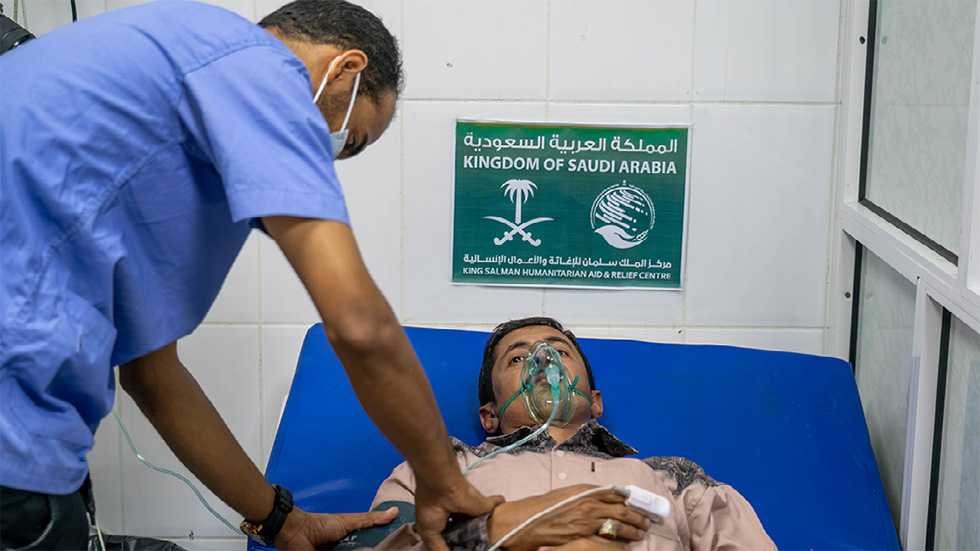WHO Yemen concludes KSrelief-funded project to provide life-saving services, through the installation of 5 oxygen stations
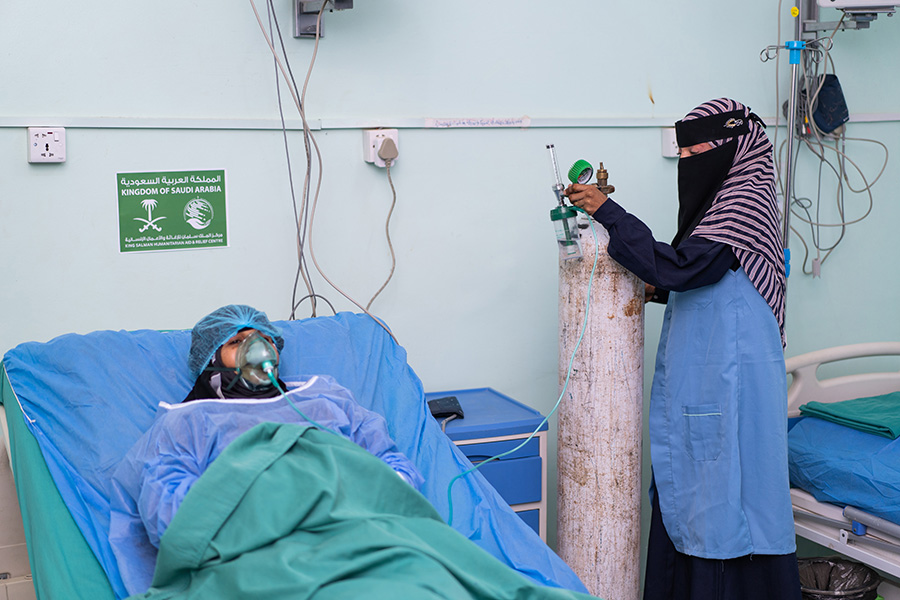 29 January 2024, Aden, Yemen – WHO and Yemen’s Ministry of Public Health and Population have successfully implemented a project entitled “Provide Life-saving Services in Selected Hospitals in Yemen through the Installation of 5 Oxygen Stations”. The project was made possible thanks to generous funding from King Salman Humanitarian Aid and Relief Centre (KSrelief).
29 January 2024, Aden, Yemen – WHO and Yemen’s Ministry of Public Health and Population have successfully implemented a project entitled “Provide Life-saving Services in Selected Hospitals in Yemen through the Installation of 5 Oxygen Stations”. The project was made possible thanks to generous funding from King Salman Humanitarian Aid and Relief Centre (KSrelief).
From March 2022 to October 2023, the project installed 5 oxygen stations in strategic locations in Abyan, Al Maharah, Hadhramaut, Marib and Shabwah governorates. This collaborative effort between WHO and KSrelief reflects a shared commitment to strengthen health systems in Yemen and exemplifies resilience-building through ensuring health service continuity in targeted hospitals.
The 5 oxygen stations now supply critical oxygen to hospitals and cater to the oxygen needs of 88 nearby health centres. This has significantly enhanced the health infrastructure in remote districts, especially in high-risk areas.
Oxygen network piping systems were also set up as part of the initiative, to bring the oxygen from the production site directly to the wards of the relevant hospital. In addition, 21 technical and hospital personnel were trained on station maintenance, and a monitoring system was put in place to ensure the effectiveness of the overall effort.
To date, nearly 236 000 beneficiaries from the communities next to the hospitals have benefited, with an estimated 85 454 patients receiving essential oxygen therapy. These figures highlight the profound impact on patients in need, emphasizing the life-saving nature of the project.
“On behalf of WHO Yemen, I would like to express our deepest gratitude for the funding received from KSrelief,” said Dr Arturo Pesigan, WHO Representative in Yemen. “This project has not only enhanced the financial efficiency of oxygen supply to health care facilities but also improved access to consistent medical oxygen in prioritized governorates through strategic procurement and deployment. This emphasizes the commitment to sustainable and accessible health care solutions for communities in need.”
Mr Naif Asiri, Assisting Director, KSrelief Aden branch , said: “King Salman Humanitarian Aid and Relief Centre has played a crucial role, in collaboration with the World Health Organization, in bolstering health care services by supporting programmes and projects that encompass various institutions within the health care sector in Yemen. Oxygen stations stand out as vital projects with significant impact, functioning to supply government hospitals across 5 Yemeni governorates. These stations, with their production capacity, contribute to the enhancement of health services within the corresponding health departments.”
“We highly appreciate the partnership with the World Health Organization in the implementation of the project to support oxygen stations in Yemen – the second phase. Additionally, we acknowledge the commendable efforts of the Yemeni Ministry of Public Health and Population in overcoming challenges associated with the project,” added Mr Asiri.
The successful collaboration between WHO, the Ministry of Public Health and Population and KSrelief supports the sustainable presence of oxygen in the 5 governorates for the people of Yemen. It also sets a precedent for future collaborative efforts in health infrastructure development.
KSrelief has been one of the largest contributors to the Yemen Humanitarian Response Plan since 2017, having contributed over US$ 320 million to WHO in support of humanitarian and health response operations.
Empowering lives: impactful oxygen station on-the-job training
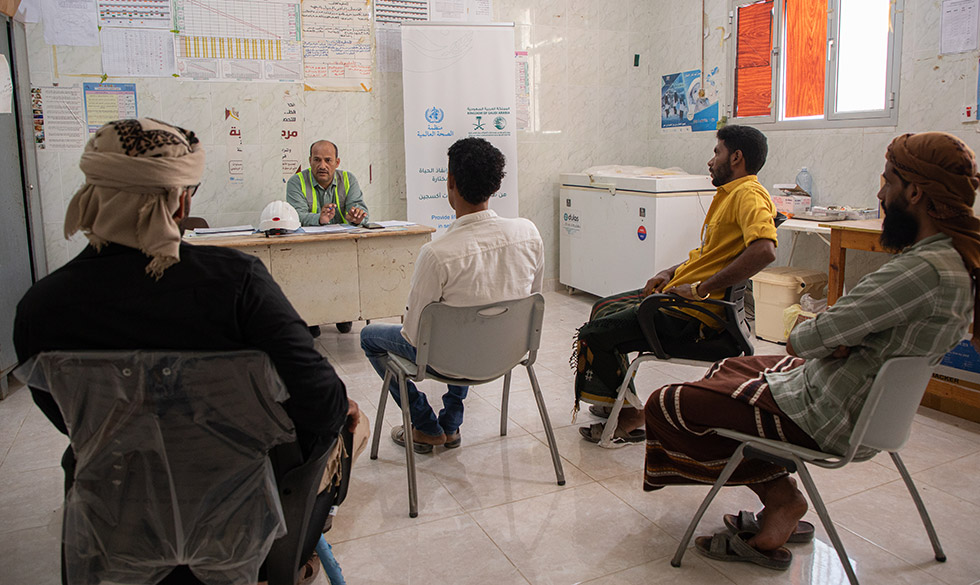 Training under way in Tarim district, Hadhramaut governorate. Photo credit: WHO
Training under way in Tarim district, Hadhramaut governorate. Photo credit: WHO
29 January 2024 – With funding received from King Salman Humanitarian Aid and Relief Centre (KSrelief), WHO has set up 5 life-saving oxygen stations in hospitals across 5 key governorates in Yemen. This impactful project has involved a series of crucial activities, including provision of electric generators, construction of structure for oxygen station equipment, procurement and installation of oxygen plants, implementation of an oxygen network piping system to distribute medical oxygen to the wards in each hospital, and training of 21 skilled technical workers.
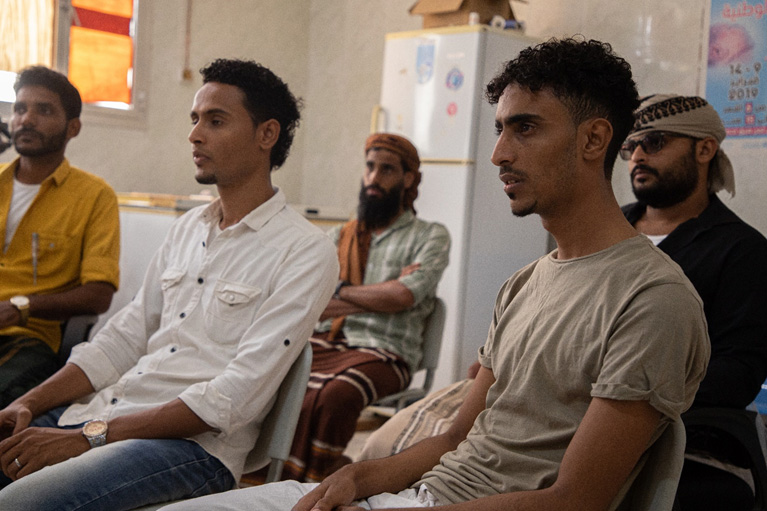 Contractor Mr Hashim Aidroos (front row, right) in the training session. Photo credit: WHOMinistry of Public Health and Population engineers thoroughly inspected the oxygen stations before they were officially handed over to the hospitals. The oxygen stations are now playing a vital role in supplying medical oxygen to the hospitals, ensuring a lifeline for those in critical need. An integral part of the project was the 3-day training provided to the technical workers from the 5 hospitals. This on-the-job training ensures the efficient functioning and delivery of oxygen services at these crucial health facilities.
Contractor Mr Hashim Aidroos (front row, right) in the training session. Photo credit: WHOMinistry of Public Health and Population engineers thoroughly inspected the oxygen stations before they were officially handed over to the hospitals. The oxygen stations are now playing a vital role in supplying medical oxygen to the hospitals, ensuring a lifeline for those in critical need. An integral part of the project was the 3-day training provided to the technical workers from the 5 hospitals. This on-the-job training ensures the efficient functioning and delivery of oxygen services at these crucial health facilities.
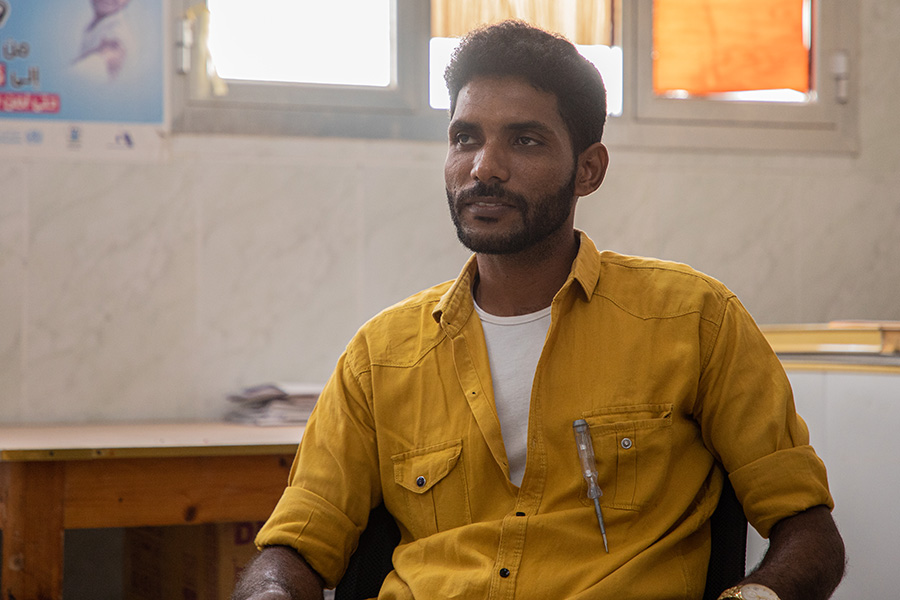 Maintenance technician Mr Ahmed Ali during the training session. Photo credit: WHO“The training session on the oxygen station today was incredibly insightful,” said contractor Mr Hashim Aidroos. “I gained a comprehensive understanding of the oxygen’s source, its various types and its crucial role in sustaining both humanity and hospitals. Recognizing its significance for patients, I personally believe we need more of these stations to alleviate overcrowding and enhance health care services.”
Maintenance technician Mr Ahmed Ali during the training session. Photo credit: WHO“The training session on the oxygen station today was incredibly insightful,” said contractor Mr Hashim Aidroos. “I gained a comprehensive understanding of the oxygen’s source, its various types and its crucial role in sustaining both humanity and hospitals. Recognizing its significance for patients, I personally believe we need more of these stations to alleviate overcrowding and enhance health care services.”
“This station saves time and costs, being here in Qishn,” he added. “We, as contractors, are committed to fortifying its operations, fostering collaboration and ensuring its continued success. From our experience and discussions with people we know, the impact has been tangible.”
Added another trainee, Mr Ahmed Ali, a maintenance technician: “We learned the sophisticated process of extracting oxygen from nature, mastering the techniques of filtration and purification to fill cylinders with pure oxygen. This visionary project is designed to cater not only to our district, but I personally see it as a great step to the whole of Yemen.”
“The joy is immeasurable when witnessing a patient’s recovery,” he went on to say. “As the oxygen station commenced its operations, a moment of divine satisfaction embraced us, marking balance and independence from external oxygen sources.”
 Mr Abdullah Khalid Shallal, a dentist, also found the training very useful: “The training was valuable for us, equipping us with essential skills in operating machines, filling cylinders, and exercising caution due to the presence of flammable materials. Before the establishment of the oxygen station, obtaining oxygen was a constant struggle, relying on donated cylinders. Now, with the station in operation, we are not only self-sufficient but can also provide oxygen to others.”
Mr Abdullah Khalid Shallal, a dentist, also found the training very useful: “The training was valuable for us, equipping us with essential skills in operating machines, filling cylinders, and exercising caution due to the presence of flammable materials. Before the establishment of the oxygen station, obtaining oxygen was a constant struggle, relying on donated cylinders. Now, with the station in operation, we are not only self-sufficient but can also provide oxygen to others.”
“Grateful for the oxygen station, we aspire to extend these services throughout Yemen, fostering the development and enhancement of the country’s health department,” he continued.
“Witnessing a patient’s recovery and improvement is an indescribable joy. The arrival of the oxygen station is a blessing,” said Mr Shallal. “We hope for its expansion, offering more stations, services and additional health care departments. This, we believe, will contribute to the overall advancement of the health sector.”
Lifeline of hope: health care in remote areas is enhanced by the KSrelief oxygen station
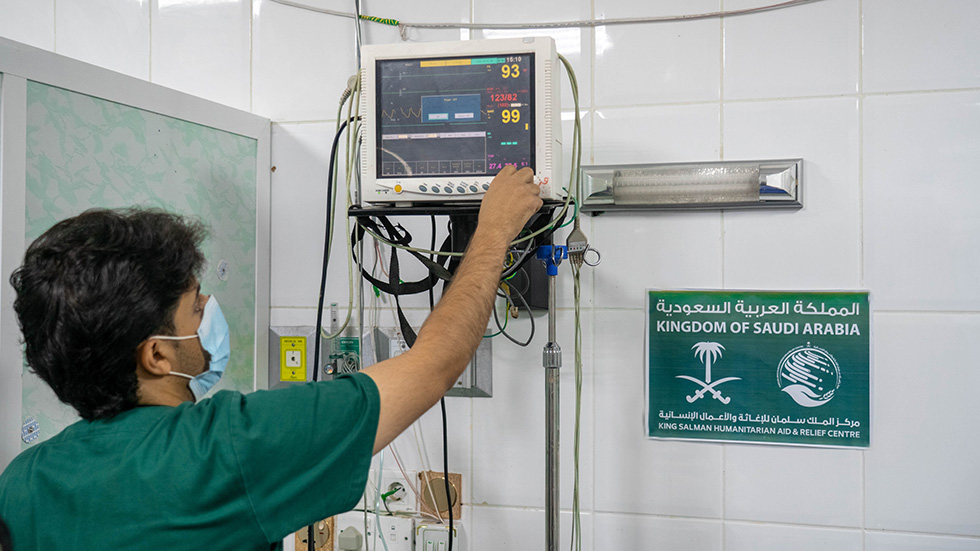
28 January 2024 – Nestled in the remote reaches of Bayhan district, Shaheed Al Defaiaah Hospital is a vital element of health care provision. In this isolated part of Yemen, this hospital provides access to medical care at reasonable prices, making it a lifeline to local communities.
The hospital plays a crucial role in facilitating the urgent transfer of patients who require complex and specialized treatment while ensuring that others in need receive timely and proper care.
 Given this critical mission, the support from King Salman Humanitarian Aid and Relief Centre (KSrelief) to establish an oxygen station at the hospital benefits not only the district but also the entire Shabwa governorate . The new station ensures a steady and reliable supply of oxygen to those in desperate need.
Given this critical mission, the support from King Salman Humanitarian Aid and Relief Centre (KSrelief) to establish an oxygen station at the hospital benefits not only the district but also the entire Shabwa governorate . The new station ensures a steady and reliable supply of oxygen to those in desperate need.
"The oxygen station replaced the previous practice of transporting oxygen from nearby districts, providing a more sustainable solution for Bayhan district,” said Emergency Department Manager Dr Mohammed Tawfiq Sheikh Al-Fatmi.
From struggle to hope: Al-Akhdar Hadi’s encounter with the oxygen station
In Alghariqa village in Bayhan, Mr Al-Akhdar Saleh Ahmed Hadi , a resilient 30-year-old asthma patient, vividly shares the uphill battle his family has faced due to the relentless grip of asthma. “Asthma appears to run in my family,” he said. He went on to describe the severe breathlessness that he endures when exposed to dust or the smoke from burned incense.
Both Mr Hadi and his mother are asthma patients and require oxygen supply from time to time. Unfortunately, this essential resource has often been unavailable owing to oxygen shortages in the area. These frequent shortages have left patients like Mr Hadi and his mother gasping for air during distressing asthma attacks.
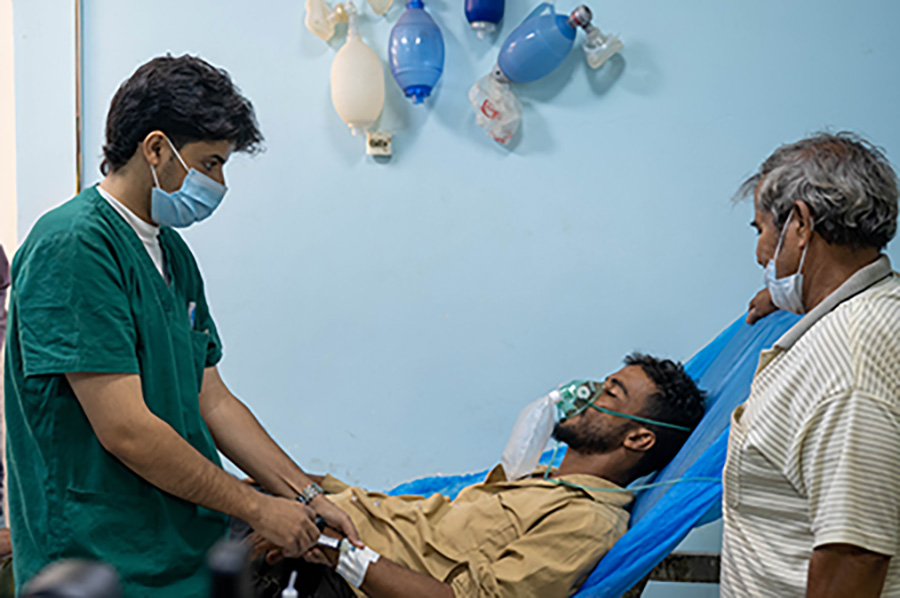 “Asthma is a relentless adversary for my family,” Mr Hadi stressed. “My mum and I need a supply every now and then – especially during dusty weather – which we sometimes could not find.”
“Asthma is a relentless adversary for my family,” Mr Hadi stressed. “My mum and I need a supply every now and then – especially during dusty weather – which we sometimes could not find.”
The setting up of an oxygen station in the area, with the aim of supporting all patients like Mr Hadi, has transformed the situation. Oxygen availability has increased, lessening the struggles faced by both patients and health workers, especially in critical asthma and stroke cases . “The station alleviated many of the struggles for health care providers and patients, as oxygen is mostly used and is a crucial medical supply, and the presence of the station alleviated the concerns we used to have before,” said Dr Al-Fatmi .
“I’m glad that we will finally be able to find the oxygen when needed the most. I feel more secure for myself and my family,” concluded Mr Hadi.
The oxygen station project surpasses mere oxygen provision – it signifies a commitment to make oxygen available to all , whenever it is needed. The community has felt the positive effects of the project, confirming that the project has exceeded expectations in all the geographic areas it has managed to reach. The improved accessibility to oxygen has emerged as a lifeline for vulnerable families in dire need of this essential service.
Breathing life into Yemen: impact of the Five Oxygen Stations life-saving initiative
Yemen’s struggle: a need for oxygen amid the crisis
Due to the crisis in Yemen has left many health facilities grappling with urgent needs that must be met to be able to provide essential health services. These needs include electricity and fuel: a shortage affecting both the public and private sectors and disrupting oxygen production is making an already critical situation worse.
Medical oxygen is a life-saving and therapeutic treatment for various medical conditions. These include both acute and chronic diseases such as respiratory diseases, cardiovascular diseases, COVID-19 and pneumonia, along with critical complications across all age groups. Demand for oxygen is growing, yet in many countries, including Yemen, delivering the much-needed quantity to the health system remains a significant challenge.
Oxygen is indispensable in Yemen’s clinics and hospitals. It is necessary for surgeries, maternal and child care and the treatment of medical conditions such as asthma and pneumonia. Epidemics have strained Yemen’s medical oxygen supply, and ongoing conflict has left hospitals and clinics without easy access to fresh oxygen supplies, worsening the challenges they face.
KSrelief’s vital role: transforming health care in Yemen with the Five Oxygen Stations initiative
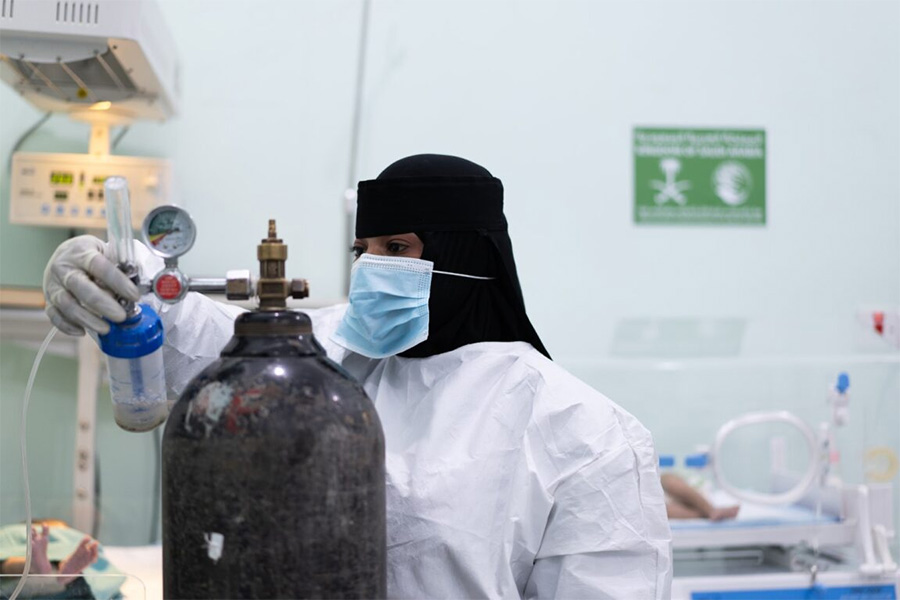 With generous support from King Salman Humanitarian Aid and Relief Centre (KSrelief), WHO has implemented a transformative project, installing 5 oxygen stations across Abyan, Hadhramaut, Al Maharah, Marib and Shabwah governorates in Yemen. These stations, each set up in a major hospital, address the critical need for a sustainable medical oxygen source in remote health facilities.
With generous support from King Salman Humanitarian Aid and Relief Centre (KSrelief), WHO has implemented a transformative project, installing 5 oxygen stations across Abyan, Hadhramaut, Al Maharah, Marib and Shabwah governorates in Yemen. These stations, each set up in a major hospital, address the critical need for a sustainable medical oxygen source in remote health facilities.
This strategic move not only cuts costs but also fortifies health facilities, stabilizing operational capacities and ensuring a reliable source of medical oxygen. The impact extends beyond basic care to also benefit intensive care units, nursery units, emergency units, operating theatres and other treatment units.
The project has surpassed expectations, touching the lives of 235 943 beneficiaries, including 85 454 people who received life-changing oxygen therapy. This initiative has gone beyond its goals, significantly enhancing the health care landscape and health and well-being in the 5 governorates.
Life breathes easier: Dr Al-Zubaidi unveils the impactful journey of KSrelief’s oxygen station in Tarim district
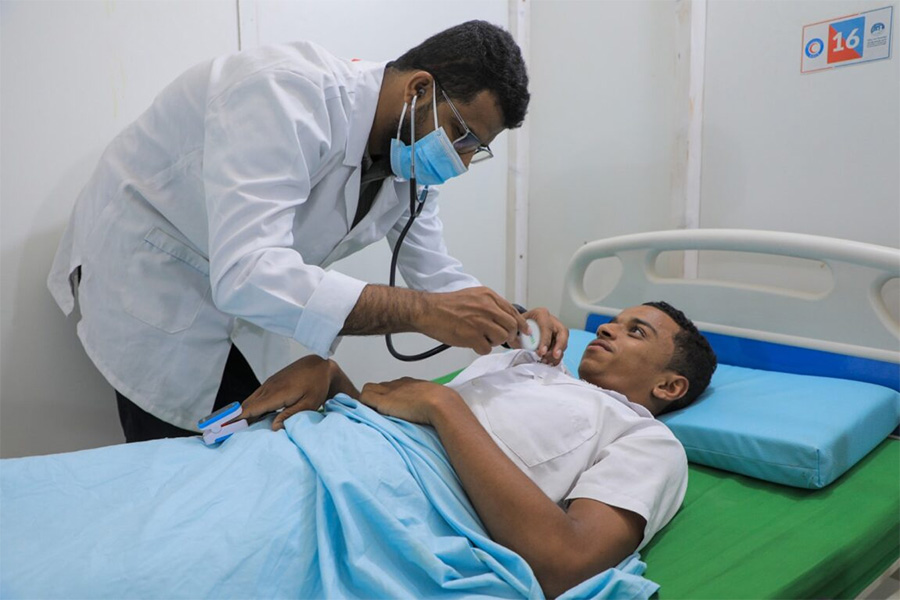 WDr Mohyeldin Al-Zubaidi, who holds a degree in general medicine and surgery, is a dedicated general practitioner in the emergency room of Tarim Hospital, Hadhramaut. Day after day, he tirelessly attends to urgent and non-urgent cases, providing crucial medical interventions to those in need.
WDr Mohyeldin Al-Zubaidi, who holds a degree in general medicine and surgery, is a dedicated general practitioner in the emergency room of Tarim Hospital, Hadhramaut. Day after day, he tirelessly attends to urgent and non-urgent cases, providing crucial medical interventions to those in need.
The COVID-19 emergency posed an unprecedented challenge for the hospital and its staff. An absence of the necessary interventions, especially oxygen-related treatments, compelled patient transfers, causing immense distress to families and caregivers. Dr Al-Zubaidi and his colleagues ardently advocate for the full range of services in all hospitals to ease the burden on patients and their loved ones.
“This hospital has a remarkable impact on the community,” remarked Dr Al-Zubaidi. “The Tarim district has witnessed a significant improvement in health care access due to the installation of a cutting edge oxygen station at the hospital. People can now easily access the oxygen supply they need.”
Dr Al-Zubaidi’s team cares for a diverse range of people, including society’s most vulnerable. The hospital supports those in critical need, such as elderly people, newborns and infants suffering from heart and lung disorders or congenital heart problems. The oxygen station has transformed their well-being, breathing new life into their existence.
“In the past, patients had to travel long distances to different districts in search of oxygen, risking fatalities and encountering additional health complications due to the distance and lack of available services,” explained Dr Al-Zubaidi. “However, with the establishment of the oxygen station in the Tarim district, it has become a cornerstone for the area, a testament to the transformative power of compassion and a single initiative on an entire community.”








